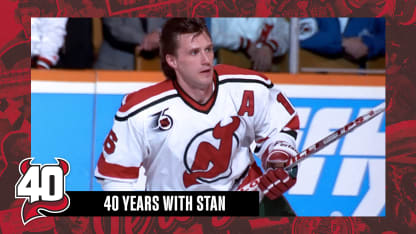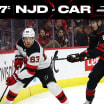Once upon a time, Henry Wadsworth Longfellow penned a poem, "Rainy Day."
One of its classic lines went as follows: "Into Each Life Some Rain Must Fall -- But Too Much Is Falling In Mine."
Once upon a hockey time that ruinous rain fell on the Devils and I was witness to a pair of awful events that I mournfully call "The Goals I'll Never Forget -- But Wish I Could."
What's more, the fact that I'm even writing this now is painful enough but since this is an everything history, there's no point in ignoring the facts. So, here goes:
This particular 1989-90 Devils' saga actually was replete with results and most of them were good. For starters, the club had a spark to it. And as a result, the joint was jumpin' in East Rutherford.
General manager Lou Lamoriello had added players with pizzazz, starting with Claude Lemieux, a firebrand who could flame up goal lights. Kirk Muller had emerged as a galvanic captain while Laurie Boschman, the prime hero of this tale, not only could score but was hailed as one of the National Hockey League's best defensive forwards.
"We had a nice mix," said Boschman. "Fellas like Walt Poddubny had offensive skills while there was plenty of toughness; especially when Troy Crowder was on the ice. There was a feeling that we'd be a factor in the Patrick Division race."
But the feeling in the front office was less enthusiastic as the season reached the mid-winter point and bad games began to overshadow the good. Lamoriello believed that a coaching change was in order.
The Two Goals I'll Never Forget - And Wish I Could! | 40 Years with Stan
Two disallowed goals stick firmly in Stan Fischler's memory... though he wishes they wouldn't!

Finally, Lou fired John Cunniff and replaced him with a firecracker named Tom (The Mouth That Roared) McVie. The graveled-voice optimist proved to be a tonic-times-ten.
"Tommy had an infectious spirit," added Boschman, "and, even when times were bad, he kept us on an even keel. All we really wanted was to get into the playoffs."
That target was reached at the beginning of spring. McVie's Marauders finished in fourth place, ahead of Philadelphia and two behind third-place Washington as well as trailing the Rangers by six points.
Boschman: "Had we been able to beat the (last-place) Islanders a few times we actually would have had a shot at first place. But since that didn't happen we had to make the best of it."
However, "The Best" was not exactly a tasty product. New Jersey had finished nine points behind the first place Penguins who were led by future Hall of Famers Mario Lemieux and Paul Coffey.
On the positive side was the fact that New Jersey invariably played its best hockey when in the underdog role. Considering that the series opened in Pittsburgh -- and the Devils' record was 0-4 at The Igloo -- the term "underdog" actually was an understatement.
"We weren't intimidated," Boschman assured the reporters on the scene. "We figured we'd just go out, play our game and see what happens."
What happened was that the Devils played what McVie labeled "Old-Fashioned Hockey" and captured the opener, 3-1. Pittsburgh won Game Two, sending the series back to New Jersey for Game Three.
Once again McVie's men took the Penguins best shot and had a tie game on their hands when it appeared that Doug Brown had scored the winner with only 1:22 left in the third period.
"The puck was six inches over the goal line," Brown insisted. "It was a goal."
Those of us with the SportsChannel tv crew believed it was a goal as well but referee Andy Van Hellemond ruled no goal on the assumption that the puck had not fully entered the net.
(NOTE: This was the era that preceded NHL "war room" where the video now can be reviewed. Thus, McVie could not challenge the referee's ruling in any way, shape or form.)
It was a terrible setback for the Devils and I, for one, will never forget the depressed state we all were in when the Penguins scored the winner on a freak goal with only 50 seconds left in the third period.
To the Devils credit, they did a "grin and bear it" routine and then went out and triumphed 4-1 to knot the series at two wins apiece. What's more, it now became apparent that the underdogs were outplaying Mario Lemieux & Company
Furthermore, this point was underlined in a Game Five, 4-2, victory. The Devils now boasted a three games to two series lead and needed only one more W to clinch the tournament. Which brings me to the second Devils "goal" I'll never forget -- and only wish I could. This time, the hullabaloo all centered on disquieting events in Game Six -- the potential series-clincher -- in East Rutherford.
Although the Visitors snatched a 4-1 lead in the second period, a couple of furious Devils counter thrusts turned it into a 4-3 game. What's more McVie's stick handlers pressed on with more vigor and appeared to have actually tied the game.
Since the chief protagonist in this passion play was Boschman, I recently asked Laurie to recall the play and its aftermath. Here's what he remembers:
"It was late in the second period and now we were only down by one goal and all the momentum -- not to mention the home crowd -- was with us all the way. At this point, we had owned the puck and my linemate, Claude Lemieux was looking to pass. He decided to skim the puck to me, cross-ice, as I was breaking for the front of the net. By now, I was skating hard toward Tom Barrasso, the Penguins' goalie, and I had to put on the brakes or I would have knocked him over.
"As I went to stop, Claude's cross-ice pass came and bounced off my back skate as I was stopping. At that precise moment, the puck was directed toward the net.
Then, something happened:
"Before the puck went between Barrasso's legs, I clearly got my stick on it. The crowd was cheering because this appeared to be the game-tying goal and we were taking the game -- maybe the series -- away from Pittsburgh.
"But then I looked up and the referee, Bill McCreary, was furiously waving his arms back and forth, claiming 'No Goal.' What made this so tough to take is that they did have video replay. On the replay, it was evident that the puck was clearly directed in by my stick after having gone off my skate.
"Sad to say, there was no recourse. McCreary didn't consult his linesman nor anything like that. And there was no 'office' in Toronto where league people could have seen that it was a legal goal and certainly should have counted."
But, to the dismay of 19,000 arena witnesses as well as our SportsChannel crew, the goal was deleted and the game continued with Pittsburgh ahead by one.
Boschman: "During the intermission between the second and third periods, we watched the replay in the dressing room. It was evident to every single one of the guys on our team that McCreary blew the call. He missed it and we had no other recourse but to try and win the third period, but we were unsuccessful."
Sadly, the Devils -- despite furious third period assaults -- were unable to score another goal and went down 4-3. Revitalized, the Penguins returned to Pittsburgh and wrapped up the series in Game Seven.
I was crushed and have never forgotten the two goals that were not goals, especially Laurie Boschman's.
Just for the heck of it, I checked with my Devils' historian buddy, George Falkowski for his reaction to L'Affaire Boschman.
Falkowski's reply had a touch of old Brooklyn Dodger-ism about it.
"WE WUZ ROBBED!"
As for Henry Wadsworth Longfellow, the poet added a positive side of his poem, "Rainy Day," which ended with the following heartening words: Some Day The Sun Will Shine!
Sure enough, just five years after those disallowed goals that should have been allowed, the sun did shine brightly over the Meadowlands Arena.
The Devils had won their first Stanley Cup!






